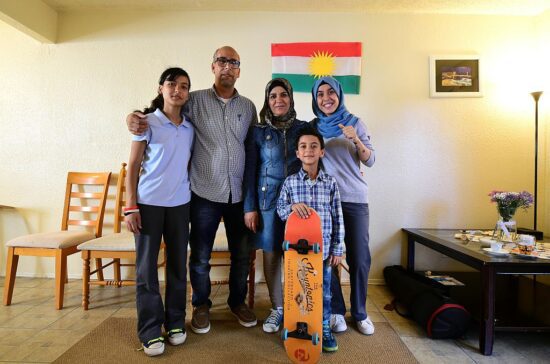It all began with a call from a local mechanic to my friend, Lucy. A Muslim woman from Tanzania was returning from delivering donations to a refugee family. Her tire blew on her way home. Once her mechanic arrived to repair the tire, they began talking about the African refugee family she had been serving. The mechanic later called his friend Lucy for help. He knew she was fluent in the family’s language and had experience in bringing people together for fellowship.
The two of them visited the family and learned there were other refugee families in need. That’s when Lucy reached out to her church to see what could be done. One thing led to another, and many of the people at my church, including myself, began caring for, loving and befriending the refugee families from Africa. We now have a ministry team and dozens of people from our church and surrounding community that are involved in the lives of our refugee friends.
Beginning a ministry to refugees in your church
Although, not everyone is able to meet refugees as naturally as this, you are probably aware of refugees in your town. So how can everyday Christians like you and me start ministering to these neighbors? Forming relationships with refugees might be challenging at first. If you’re uncertain where to start, you can use the Refugee Processing Center’s Affiliate Directory to find out about agencies in your city. It may take some time, but with perseverance, you’ll likely find these agencies helpful.
Once you begin to build relationships with refugees and have made your intentions known to the agency supporting them, I encourage you to share your desire with your pastor. Having the blessing of the leadership of your church will prove to be invaluable to your ministry—it becomes everyone’s ministry. In addition, there are a few things you can do to enhance this kind of ministry in your church:
1. Seek to know the person: At my church, we refer to “our friends who came as refugees,” because we want to recognize that they are more than refugees. They are people with hopes and dreams just like you and me. They have feelings, experience victories and make mistakes. Since many of us are fixers and doers, we can sometimes turn people into projects. My best friend, after traveling to Berlin to work with a refugee ministry, wisely said, “Remember the person, not the problem. Remember the name, not the need.” Of course, she didn’t mean to shove their problems aside or ignore the needs, but before all of that, it’s important to remember refugees are fellow image bearers whom we are called to love, help and befriend.
2. Recruit a team: When I first met our friends from Africa, it was through a small group of people from my church that had been ministering to them. When I joined the team, it was made up of three Americans and two others representing different countries. I can’t imagine doing any of this without them. Recruiting a team is vital. Teammates will encourage and build one another up, spurring one another on in love and good deeds as the Word says. Having a team will better enable you to love and empower the people you’re befriending.
3. Build a “house”: Once you have a few people who desire to minister to and befriend refugees, the team can start to bring structure to their efforts. I would recommend building a figurative house together. Here are the essential parts:
- A foundation grounded in Christ: The team should first develop the mission and goals of the group. Crafting a mission statement will serve as a filter to determine which ideas should be pursued. Coupled with prayer, this should help remind everyone to stay focused on Christ and remain united. Our teams’ mission statement has proven to be a much needed reminder for us: “Our core mission to our friends who came as refugees is to love and empower them, thereby drawing them closer to our Lord Jesus Christ and bringing glory to Him.”
- A framework of team roles and objectives: Each person should have an essential role that supports the ministry and overall mission. Dreaming together and drafting a list of goals will also enable the team to prioritize needs and better determine how they will be met. Putting an organized approach behind the team will allow everyone to be more effective in the long run. When dreaming of ways to help your friends, I recommend bringing them into the conversation. You may find what you think is helpful differs from what your friends actually desire.
- Doors to let people in: Helping refugees transition is no small task. It should be recognized as a long-term commitment. Opening the doors to involve others who are interested has helped us do far more than we could do on our own. Raising awareness and spreading the word is an effective tool in getting people involved in the ministry, but it’s important to be given the approval and blessing of your refugee friends before doing so. In addition, the approach should be one that honors and preserves the dignity of those you’re serving.
- A roof for protection: It’s important for the team to know their limitations. This kind of thinking has allowed us to put reasonable boundaries in place and pace ourselves as we walk alongside our friends. The first boundary the team must set is one where everyone recognizes who God is and who they are. We must remember our place and his. When we are grounded in knowing that the Lord is the one in control, we’re better able to recognize our own limitations, establish healthy boundaries and persevere in our mission.
The church has a unique opportunity to love boldly and serve the sojourners that have come to America. At my church, our mission is to be “For the Gospel and For the City,” which means we are committed to reaching every person in our city with the good news of Jesus. Lucy was living out this mission when she decided to serve the refugee family. Lucy never dreamt that her actions would lead to an official church ministry. Her example shows that when you advocate for refugees, your actions will likely move others to act as well. So be encouraged and remember Jesus’ words, “As you did it to one of the least of these my brothers, you did it to me” (Matt. 25:40), as you go to the nations without ever leaving your city.









